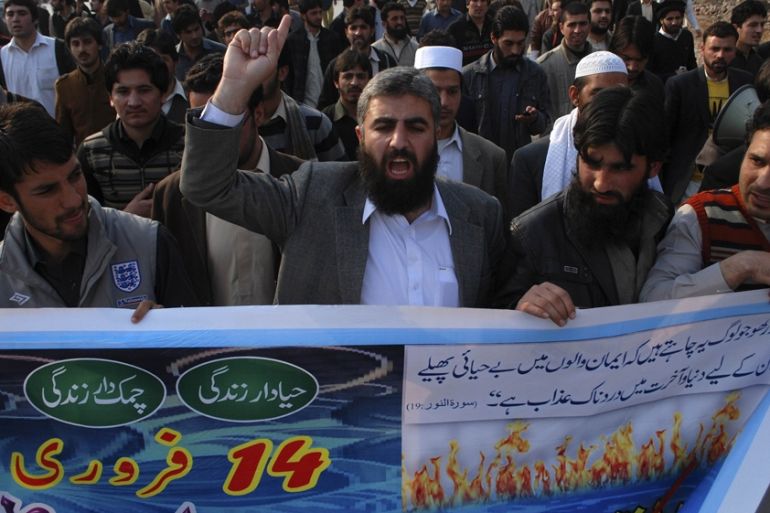Hating the day of love
Ahead of Valentine’s Day, opponents say it threatens their values and traditions.

Doha, Qatar – While many celebrate Valentine’s Day with kisses, flowers and chocolate, others around the world plan to express their distaste – some violently.
As the clock ticks closer to Valentine’s Day, shops and restaurants are being decorated with red roses and cute teddy bears with boxes of expensive chocolate on display.
Keep reading
list of 4 itemsEurope pledges to boost aid to Sudan on unwelcome war anniversary
Birth, death, escape: Three women’s struggle through Sudan’s war
Does Israel twist humanitarian law to justify Gaza carnage?
But in some countries, bitter opponents of Valentine’s Day are preparing to square off with its fans.
Valentine’s Day is considered sacred by some Christian communities, such as the Anglican Communion and Lutheran Church, who commemorate Saint Valentine of Rome. According to popular myth, Saint Valentine was executed on February 14, centuries ago, for performing weddings for soldiers who were forbidden to marry.
Since Roman times, February 14 has evolved into an occasion for lovers to express their feelings for each other with gifts of roses, chocolates, and dinners out in pricey restaurants.
However, in many places the day of affection is met with official reprimand and unofficial violence.
Punishment for love
Last year, when some Saudi men celebrated the day of love, they were arrested by police and sentenced to 32 years each in prison and 4,500 lashes for being found with “unrelated women, drinking and dancing”.
In Pakistan, some Islamic youth groups take it upon themselves to police young lovers on Valentine’s Day.
“There are many posters around my city by Jamaat Islami Pakistan’s youth wing, Shabaab-e-Milli, saying that those boys and girls found celebrating Valentine’s Day will be forced to marry each other,” Awais Iqbal told Al Jazeera by phone from Lahore.
Iqbal, a TV presenter at Alite Channel, recounted how in his university days he was beaten by a Jamaat Islami Pakistan crowd for just talking to a girl.
“I was discussing preparations for a class function with one of the girls when suddenly members of Shabaab-e-Milli dragged me to the ground and beat me up, rupturing my ear drum. The girl I was talking to was hit on the head and knocked unconscious.”
Would you not be furious to find your sister celebrating Valentine's Day with a stranger?
Iqbal said students at Punjab University in Pakistan where he studied generally fear such mob attacks, making it impossible for them to celebrate Valentine’s Day.
Shabaab-e-Milli defended the group’s sometimes-violent actions against the day of love and those who celebrate it.
“Would you not be furious to find your sister celebrating Valentine’s Day with a stranger?” Shabaab-e-Milli spokesman Zubair Khan asked Al Jazeera.
“If we will not stop this, then somebody else will. We may even slap these people for committing such acts and summon their parents to tell them what their offspring is up to.”
Iqbal said despite the threats, there are still places where men and women in Pakistan can still enjoy Valentine’s Day in peace.
Love by the rules
In Malaysia, an Islamic country by constitution, assistant chief Islamic cleric Ustaz Mat Jais Kamos of Selangor state told Al Jazeera religious edicts have been issued against Valentine’s Day.
Selangor is strongly influenced by Malaysia’s Islamic political party PAS. However, it has refrained from banning celebrations, and violence against those who do is rare.
“Islam prohibits Valentine’s Day because unrelated boys and girls come close to each other during this day. It saddens and angers me to see this,” Kamos told Al Jazeera.
Kamos said anti-Valentine pamphlets are dispersed and public lectures given warning Muslim youth against Valentine’s Day’s “evil” consequences. But no physical action is taken against young lovers.
Professor Abdullah Ahsan, a scholar of comparative civilisation at the International Islamic University Malaysia, explained why Valentine’s Day is so offensive to Muslims in general.
“I think mainly because conservatives – I shall avoid ‘fundamentalists’ – are most concerned about family values and Valentine’s Day has the tendency to deviate from those values,” he said.
|
|
Abdullah also pointed out that anti-Valentine’s sentiment is not unique to Muslims only. “This is true for Buddhists, Christians, Hindus and Jews alike,” he said.
Abdullah criticised the violent campaigns of some groups against those who partake in Valentine’s Day, and suggested community discussions should be held over the issue.
“Through discussions, questions and answers, stories about problems of pre-marital free interactions between boys and girls should be the main means of education, in my opinion… All forms of coercion must be avoided.”